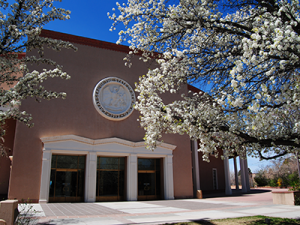A few years back, I put on my “water beat reporter” hat and went to Santa Fe for the spring legislative session to track some bills that I found interesting. The newspaper has a team of skilled legislative specialists who I’ve always been able to lean on, but it was fun to bring my water beat background into that world and see how the two fit together.
I spent a lot of time in hearings, and hanging out in the hallways and lobbies (“lobbyists”!) and came away with the realization that we simply lack the institutional capacity for the huge range of questions that we ask our system of legislative governance to deal with.
This really hit home when I tried to arrange an interview near the end of the session with Peter Wirth, a smart Democratic senator from Santa Fe who was working on some of the water legislation that interested me. I met him in the hallway behind the Senate floor during an afternoon voting session for what may count as one of the strangest interviews of my life. We’d talk for a few minutes, and then be interrupted when the Senate clerks would stick their heads into the hallway and shout “Voting!”. And all the legislators in the hall would run back in to vote, then return to finish their conversations.
Over a half hour or 45 minutes of conversation, we must have been interrupted six or seven times while Wirth had to yank his attention away from our topic to some other bit of governance. Finally, Peter had to leave for good, because they were beginning to debate a complex state pension issue that required his full attention.
I wandered back upstairs to the press gallery, and looked on as Peter delivered a crisp, passionate, extremely thoughtful floor speech on the pension issue. He had pivoted without time to catch his breath from a deep and thoughtful discussion of water policy to a deep and thoughtful discussion of an entirely different question, which in turn was only one of many that we’ve asked Peter and his colleagues to cope with.
We don’t pay him for this. We don’t pay for staff to help him with this. Once I watched the ebb and flow of this for a two month session, I came away unsurprised that the institution is incapable of trying to rewrite 19th and 20th century water laws to meet 21st century problems. They have to wrestle with a budget, and difficult education questions, and energy policy, and environmental regulations, and (substitute here the thing that you really care about that they haven’t quite gotten their arms around). By my count there are already 31 pre-filed bills for the coming session that deal in some way with water. I’m a professional water nerd, paid (sorta) full time to work on this stuff, and I can’t keep all that straight. How can they?
People who agree with me about the problem suggest two overlapping solutions.
One is to pay legislators, so it is not solely the province of people with the privilege of taking a few months off now and then to do the public’s business. The second, which I think could be even more important, is to create paid legislative staff, so guys like Peter could, for example, have a water policy expert at their disposal. There is some existing paid staff structure, but it’s not enough, and it forces legislators to rely instead on lobbyists as a sort of informal technical support system. That is less than ideal.
Heath Haussamen has a great piece in New Mexico In Depth’s big new legislative package that gets at this problem:
Alan Webber, who made a career in the business world, noted the speed that society moves today. The conversation about reform must start with the premise that the world has changed, said Webber, who ran unsuccessfully for governor in 2014.
“The speed of change is faster. The world of technology is faster,” he said. “Lots of things that seemed self-evident (when New Mexico became a state in 1912) are much more complicated. We really ought to equip ourselves with the legislative structure to deal with these problems, to get ahead of them.”
(And, as an aside, the whole NMID package is worth a look.)


I collect a paycheck from the California Legislature these days, so I should applaud the wisdom of your thoughts. In practice, though, the lobbyists still have extraordinary sway, and interest in policy nuance as opposed to the political jungle gym remains rare. Job No. 1 is still getting and staying on top, because otherwise nothing else matters.
They do have paid staff during the session for one or two months, but not when they go home.
The session isn’t the only thing the Legislature does: they have interim committee meetings the rest of the year. That’s where issues and bills really get talked about. (I think they get per diem payments for attending them, even if it’s not far from home.) The public can attend these meetings; the committees have both House and Senate members on them. Look them up under Committees on the legislature’s website: http://www.nmlegis.gov/lcs/